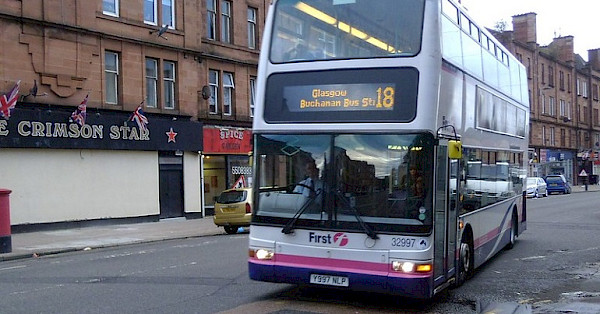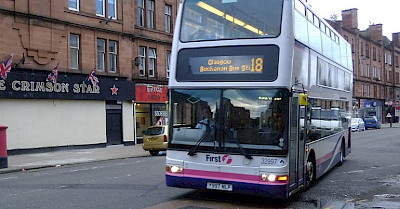
29 Jan 2020
By Rebecca Menzies, Get Glasgow Moving
Last June when First announced they were selling their UK operations, Get Glasgow Moving launched our campaign to 'Take Back Our Buses'.
Not long after, Glasgow City Council unanimously voted to investigate taking First into public ownership.
Today at 2.30pm we'll be handing in our petition for publicly owned buses to the Leader of Glasgow City Council, Susan Aitken. With 7,000 signatures, it's clear that the people of Glasgow demand better.
Despite the news that First are no longer selling, it doesn't mean Glasgow can't have a publicly owned & controlled bus company.
New powers - which we campaigned for - in the Transport Scotland Act enable Councils to set up their own publicly owned bus company, like Lothian Buses, and allows for re-regulation through bus franchising, like in London.
Regulation is essential to enable us to set timetables that reflect the times people actually want to travel, create affordable integrated ticketing, and finally begin to integrate our public transport network across all modes.
If we don’t seize this opportunity to prepare a region-wide franchising framework, we will fall yet further behind other UK cities in terms of productivity, inequality, carbon emissions and air pollution.
We want to see Glasgow City Council, other local authorities and Strathclyde Partnership for Transport (our Regional Transport Authority) be proactive and utilise these new powers with support from the Scottish Government.
Last year the Scottish Government announced £500 million funding for bus infrastructure to ease congestion, and this was referenced last week by Susan Aitken in her announcement that plans for public ownership were off the table. However, this is not enough to improve our bus network.
It is highly unlikely this fund will be spent improving connectivity in Glasgow City Centre or in surrounding communities. It is more likely to be directed into priority lanes on motorways for inter-city travel. This is of course welcome, but doesn't solve Glasgow's issues. It’s also more public subsidy to improve private operator’s competitiveness and profit.
Running public transport for profit is not compatible with responding to the climate crisis, nor tackling poverty in Glasgow. Buses are supposed to serve the people, but bus partnerships will always favour profit over passengers, and that is why they are failing us.
They should not be getting another chance.
Publicly-owned buses, such as in Edinburgh and Nottingham consistently outperform private operators and win awards for their service. There’s no reason, other than an ideological commitment to privatisation, that other cities and regions across the UK shouldn’t have the same standards of buses.
Our cities must lead the way on climate action and reducing inequality.
Glasgow City Council has already declared itself a leader on climate action. It’s now time it puts those words into actions.
Right now, we have the chance to be a real leader on tackling emissions, air pollution and poverty by re-regulating our bus network and creating a public transport network that truly puts people and the environment over profit.
Given the legal powers in Scotland for regulation, Glasgow must take real action and become an example for cities across the UK on how to run public transport that puts the needs of communities first.
We can’t afford more of the same.
The petition hand-in is supported by Unite, Unison & Campaign Against Climate Change Glasgow as well as local politicians.


Comments
David Wilton 6 years ago
When things go private it's all about the shareholders getting their profits when it's publicly owned we are all in it together it is far
better.
Reply
Susan Glover 6 years ago
Nationalised utilities mean everybody pays the same for these essential services over which we have little choice but to buy unlike other commodities. Switching becomes unnecessary and the chaos of energy tariffs ceases. Privatisation of these services has not lead to cheaper prices just a chaotic system where some people adept at working the systems get things cheaper at the expense of everyone else. This is plainly unfair. The profits made from these services should go to the government to help to pay for other public services such as the NHS rather than to private investors like EDF who aren't even British! Thatcher robbed the British people by selling off these industries that cannot fail, which is why Big Business wanted them. It is not "hard-left" to argue for them to be taken back into public ownership. It is fairer for the majority of the people of this country and we should be out there making sure people understand this, especially younger people who don't remember the system before Thatcher.
Reply